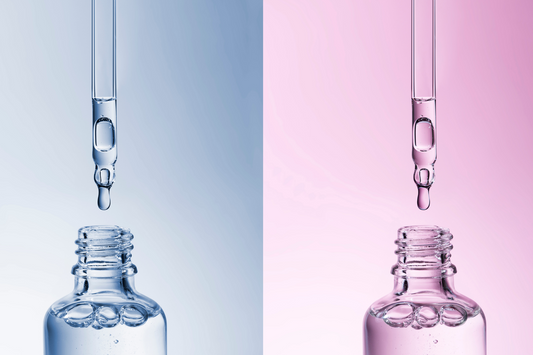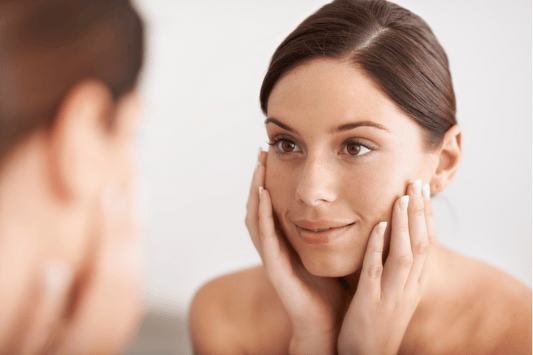Whether it’s making gains in the gym, boosting your lean muscle mass, or just trying to improve your recovery from the daily grind, creatine has been a newsworthy supplement since it was first isolated from skeletal muscle in 1832. In a world full of new supplements, each being pushed as the next big thing, creatine remains a staple—but what are the drawbacks to creatine supplementation, and why might those of us choosing to add supplemental creatine to our diets care about any negative side effects from creatine supplementation? (Spoiler alert: One of the most popular myths surrounding creatine usage claims that it causes hair loss!) We wanted to dive right in to separate the fact from the fiction, particularly when it comes to creatine use and hair loss.
What is Creatine?
When it comes to dietary supplements promising to boost athletic performance, it’s natural to wonder about the possible drawbacks. But what is creatine, and what does it do?
Like many supplements, creatine is actually an entirely natural compound that’s already produced in the body. Creatine isn’t an essential nutrient since our bodies make it on their own, and it’s produced in the liver and kidneys from a combination of the amino acids glycine, arginine, and methionine. Just like it's use is related to muscle growth, 95% of the creatine in our bodies can be found in skeletal muscle. Without getting too deep into the biology, when it comes to generating energy, the cells in our body need one compound in particular: adenosine triphosphate, commonly abbreviated as ATP. Every ATP molecule has three phosphates, and each of those three phosphate groups are like a small chain on one side of the ATP molecule. By breaking off one phosphate group at a time, energy is released into the cell so it can perform other important tasks.
Creatine—abbreviated as Cr—comes into the picture by forming phosphocreatine, PCr, with one of those recycled phosphates. Over time, PCr eventually gives back that phosphate to adenosine diphosphate (ADP), allowing it to become a fully-functioning, energy-generating molecule of ATP all over again. That’s it! More than anything, creatine helps with the recovery days in between heavy workout sessions. So why might a myth connecting creatine with hair loss persist?
Creatine & Hair Loss: Fact vs. Fiction
Because of creatine’s association with bodybuilding, as well as the spotlight on it following its usage by gold medal-winning athletes in the 1992 Barcelona Olympics, creatine has likely taken on the aura of a supplement that’s more akin to anabolic steroids. Steroids, which increase the body’s levels of dihydrotestosterone (DHT), can certainly lead to hair loss. As we’ve discussed earlier, accumulation of DHT in the scalp is a primary factor in the development of androgenic alopecia, also known as male and female pattern hair loss. A small handful of studies, particularly a 2009 study investigating 20 college rugby players in South Africa, found that creatine supplementation appeared to lead to a greater amount of DHT during and after the creatine loading and maintenance phases of the trial, although it isn’t fully understood how or why this may have occurred.
The myth surrounding creatine usage and the side effect of hair loss likely stems from those two pieces of information. First, when we think workout supplement, steroids are a catch-all term for compounds that help us bulk up. Steroids are well-known to lead to hair loss. If creatine also helps us bulk up, it makes sense that people may get it in their heads that all bodybuilding supplements can lead to hair loss. Second, given that the above rugby study showed that creatine seemed to elevate DHT levels—and we do know for certain that excess DHT can lead to hair loss—it seems slightly more reasonable to jump to the conclusion that creatine causes hair loss, too.
The Overlap Between Creatine Use & Hair Loss
Another key piece of information to consider when debunking myths and rumors is to carefully investigate the types of evidence. Empirical evidence—the kind from scientific studies and research—is good and reliable, but anecdotal evidence comes from our personal experiences and everyday stories, which can often lead us down the wrong path. It’s highly likely that anecdotes from people we’ve famously known to take creatine and other supplements, who have then gone on to experience hair loss, form a strong connection in our minds between creatine and hair loss.
Always keep in mind that this is evidence of correlation, but not always causation! It’s possible that personal stories highlighting creatine and hair loss ignore other important factors, like personal health, dietary routines, and the usage of other supplements in any daily regimen. Though the research into creatine and its effects on DHT was suggestive, the sample size of 20 college athletes was relatively small, and more research needs to be done before a firm link between creatine, DHT, and subsequent hair loss can be confirmed.





